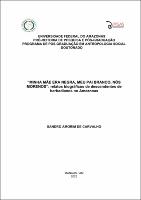| ???jsp.display-item.social.title??? |


|
Please use this identifier to cite or link to this item:
https://tede.ufam.edu.br/handle/tede/9598| ???metadata.dc.type???: | Tese |
| Title: | “Minha mãe era negra, meu pai branco, nós morenos”: relatos biográficos de descendentes de barbadianos no Amazonas |
| ???metadata.dc.creator???: | Carvalho, Sandro Amorim de  |
| ???metadata.dc.contributor.advisor1???: | Rodriguez, José Exequiel Basini |
| ???metadata.dc.contributor.referee1???: | Rufino, Márcia Regina Calderipe Farias |
| ???metadata.dc.contributor.referee2???: | Flores, Luiza Dias |
| ???metadata.dc.contributor.referee3???: | Rivas-Sánchez, Héctor Eloy |
| ???metadata.dc.contributor.referee4???: | Soares, Pedro Paulo de Miranda Araújo |
| ???metadata.dc.description.resumo???: | O início do século XX foi marcado por intensa mobilidade humana, período de grandes migrações. Nesse momento o Brasil recebeu imigrantes de diversos países, dentre eles Barbados, Ilha do Caribe Britânico. Para narrar este momento esta tese se inscreveu na interseção das ciências humanas e sociais, que dialogam entre si e são enriquecidas mutuamente dentro de um tópico que se vincula à mobilidade humana. Por meio das quais discuto o que aqui se apresenta em uma posição de fronteira entre esses campos de conhecimentos, onde debato a temática das imigrações, identidades e relatos biográficos com pesquisadores da história e das migrações caribenhas. Os imigrantes barbadianos chegaram ao Brasil no final do século XIX e início do século XX, como trabalhadores contratados por empresas estrangeiras que atuavam em território brasileiro, originários da ilha caribenha de Barbados. A maioria deles foram contratados para trabalhar na construção da Estrada de Ferro Madeira-Mamoré, em Porto Velho (RO), porém ao final das obras dessa ferrovia alguns deles permaneceram em Porto Velho, enquanto outros destinaram-se para Manaus e Belém. As fontes dessa tese foram entrevistas com representantes de famílias descendentes de barbadianas, somando-se a elas fiz a leitura e análise de documentos para compor a parte histórica da tese. Devido ao distanciamento social provocado pela pandemia de Covid-19, apliquei o uso de metodologia chamada de netnografia, pois parte das entrevistas foram obtidas por meio das Redes Sociais. Após o campo, analisei as entrevistas e documentos, o que permitiu concluir que os descendentes de barbadianos que vivem em Manaus estão vivenciando um momento de retornos às origens, buscando compreender a formação de suas identidades étnicos-culturais. |
| Abstract: | The beginning of the 20th century was marked by intense human mobility, a period of great migrations. At that time, Brazil received immigrants from several countries, including Barbados, an island in the British Caribbean. To narrate this moment, this thesis is inscribed in the intersection of the human and social sciences, which dialogue with each other and are mutually enriched within a topic that is linked to human mobility. Through which I discuss what is presented here in a frontier position between these fields of knowledge, where I debate the theme of immigration, identities, and biographical account with researchers of Caribbean history and migrations. Barbadian immigrants arrived in Brazil at the end of the 19th century and the beginning of the 20th century, as workers hired by foreign companies that operated in Brazilian territory, originating from the Caribbean Island of Barbados. Most of them were hired to work on the construction of the Madeira-Mamoré Railroad, in Porto Velho (RO), but at the end of the works on that railroad, some of them remained in Porto Velho, while others were destined for Manaus and Belém. The sources of this thesis were interviews with representatives of families descending from Barbadians, adding to them I read and analyzed documents to compose the historical part of the thesis. Due to the social distance caused by the Covid-19 pandemic, I applied the use of a methodology called netnography, as part of the interviews were obtained through Social Distance. After the field, I analyzed the interviews and documents, which led to the conclusion that the descendants of Barbadians who live in Manaus are experiencing a moment of returning to their origins, seeking to understand the formation of their ethnic-cultural identities. |
| Keywords: | Imigrantes - Caribe Estrangeiros Filhos de imigrantes |
| ???metadata.dc.subject.cnpq???: | CIENCIAS HUMANAS: ANTROPOLOGIA |
| ???metadata.dc.subject.user???: | Barbados (Caribe) Migração barbadiana Relato biográfico Memória familiar Identidade narrativa |
| Language: | por |
| ???metadata.dc.publisher.country???: | Brasil |
| Publisher: | Universidade Federal do Amazonas |
| ???metadata.dc.publisher.initials???: | UFAM |
| ???metadata.dc.publisher.department???: | Instituto de Filosofia, Ciências Humanas e Sociais |
| ???metadata.dc.publisher.program???: | Programa de Pós-graduação em Antropologia Social |
| Citation: | CARVALHO, Sandro Amorim de. “Minha mãe era negra, meu pai branco, nós morenos”: relatos biográficos de descendentes de barbadianos no Amazonas. 2023. 160 f. Tese (Doutorado em Antropologia Social) - Universidade Federal do Amazonas, Manaus (AM), 2023. |
| ???metadata.dc.rights???: | Acesso Aberto |
| ???metadata.dc.rights.uri???: | http://creativecommons.org/licenses/by-nd/4.0/ |
| URI: | https://tede.ufam.edu.br/handle/tede/9598 |
| Issue Date: | 5-Jun-2023 |
| Appears in Collections: | Doutorado em Antropologia Social |
Files in This Item:
| File | Description | Size | Format | |
|---|---|---|---|---|
| Tese_SandroCarvalho_PPGAS.pdf | 12.4 MB | Adobe PDF |  Download/Open Preview |
This item is licensed under a Creative Commons License





